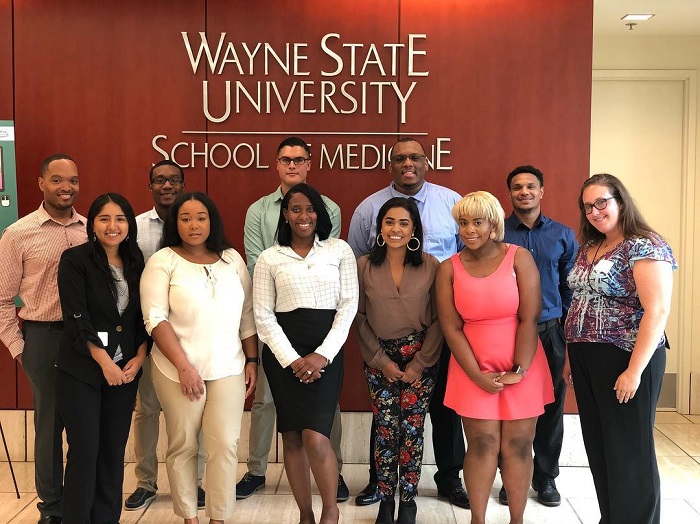
The Post Baccalaureate Program Class of 2018-2019 started the one-year program last summer.
The Wayne State University School of Medicine’s Office of Diversity and Inclusion will kick off its celebration of the Post Baccalaureate Program’s 50th anniversary at noon March 11 in Scott Hall’s Jaffar Auditorium.
All are welcome to attend the event featuring special guest lecturer Wanda Whitten-Shurney, M.D., the daughter of Charles Whitten, M.D., who founded the Post Baccalaureate Program at WSU in 1969.
Dr. Shurney, the chief executive officer and medical director for the Sickle Cell Disease Association of America, Michigan Chapter, will present “Sickle Cell Disease: Up Close and Personal.” She was appointed to the National Institutes of Health’s Advising Committee for Sickle Cell Disease in 2016, recognizing her long career as a pediatrician specializing in treating sickle cell disease. The condition affects nearly 100,000 Americans. Although it can strike all ethnicities, the great majority of patients are of African-American or Hispanic descent.
Dr. Shurney’s father was a WSU School of Medicine pediatrician who brought the nation’s attention to SCD and founded the Sickle Cell Disease Association of America. He established the Charles F. Whitten, M.D., Post Baccalaureate Endowment Fund in 1996.
Drs. Jack and Ann Miller – founders of the Department of Molecular Biology and Genetics, now the Center for Molecular Medicine and Genetics – made a generous gift in support of the program earlier this year.
The Post Baccalaureate Program was the first of its kind in the nation, initially launched to address the dearth of black students entering medical school. The free program immersed students into a year-long education in biochemistry, embryology, gross anatomy, histology and physiology to improve their odds of future acceptance into medical school. Many who graduated were accepted in the WSU School of Medicine – the first graduating in 1974 – but the program also served as a major pipeline for black students into medical schools across the nation.
The program expanded its efforts to include underrepresented minorities in medicine from Hispanic and Native-American populations, and in 1978, following the U.S. Supreme Court’s Bakke decision, cast a wider net yet again, accepting socio-economically disadvantaged students regardless of race or ethnicity.
Today, the program accepts up to 16 students each year. In the last 30 years, the School of Medicine has invested $35 million in the program, which has graduated more than 400 participants who have gone on to become physicians.